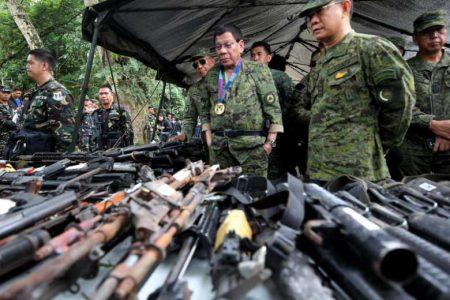
ISIS-linked network in Marawi may be prepping for attacks on Singapore and Asia
The terrorist network battling Philippine forces in Marawi may be prepping Muslim militants for similar attacks in Singapore and in East Asia, said a report released on Friday (July 21).
The network, run by Bahrumsyah, a young Indonesian fighter in Syria, and Malaysian former university lecturer Mahmud Ahmad, recruited fighters and carried out an audacious bid by ISIS to seize Marawi.
“The Marawi operations received direct funding from ISIS central and reveal a chain of command that runs from Syria through the Philippines to Indonesia and beyond,” the Institute for Policy Analysis of Conflict (IPAC) said in its report.
Hundreds of gunmen from two groups linked to the Islamic State in Iraq and Syria (ISIS) stormed Marawi, a mainly Muslim city in southern Philippines with a population over 200,000, on May 23.
They seized large parts of the city, forced the evacuation of its entire population, and fought an army brigade that resulted in a stalemate now into its ninth week. The militants used tactics in urban warfare which they picked up from veteran fighters who have returned from the Middle East.
Nearly 100 soldiers and police officers have died, and half of Marawi now lies in ruins.
Over 400 militants have been killed, but Marawi “has lifted the prestige of Philippine fighters in the eyes of ISIS central” and “inspired young extremists from around the region to want to join”, the Jakarta-based IPAC said in its report.
It warned that the Marawi conflict could lead to a “higher risk of violent attacks” in other Philippine cities and in Indonesia and Malaysia.
One posting on the Russian-developed social media app Telegram urged militants to also attack targets in Singapore, Thailand, Burma, South Korea, Japan and China.
“It is our duty to stand up against them and to bring shariah in place of the laws that these territories have. Their leaders are all anti-Muslim symbols,” it said, claiming the order came from Bahrumsyah, head of an ISIS combat unit in Syria consisting mostly of fighters from South-east Asia; and Mahmud Ahmad, who is said to be providing ideological guidance to all militants now fighting in the war-torn southern Philippine island of Mindanao.
Bahrumsyah organised the first pro-ISIS rally in Indonesia in March 2014, and left for Syria two months later. He became head of Katibah Nusantra, the Southeast Asian unit of ISIS, that same year.
Mahmud, also known as Abu Handzalah, underwent training at an Al-Qaeda camp in the late 1990s. He fled to Mindanao in 2015, after he was exposed to have recruited Malaysians to fight with ISIS and pushed to unite terror cells in Malaysia, Indonesia and the Philippines.
IPAC said Bahrumsyah and Mahmud arranged funding and recruited fighters for Marawi.
From January to March 2017, Mahmud received at least US$55,000 (S$75,112) that was apparently sent by Bahrumsyah from the Middle East to Indonesia, and later wired to the Philippines using Western Union, the American financial services firm.
Bahrumsyah had another courier send an unspecified amount from Indonesia.
Philippine security officials said ISIS might have channelled as much as US$600,000 to Mahmud.
Bahrumsyah and a former member of Islamist group Kompak, Abu Walid, were also moving money, recruiting fighters, and smuggling weapons via their contacts within four militant groups in Indonesia.
Meanwhile, Mahmud, with his “one-door policy” of a single channel for sending fighters to Marawi,has managed to unite two feuding pro-ISIS networks: Bahrumsyah’s Katibah Nusantra, and Katibah Masyaariq, linked to Indonesia’s largest pro-ISIS coalition, Jamaah Ansharud Daulah (JAD).
Since 2015, JAD had been sending men to training camps run by Isnilon Hapilon, head of the small but brutal Abu Sayyaf group and acknowledged by ISIS as leader of its South-east Asia wing, in his stronghold in Basilan province in southern Philippines.
Hapilon, brothers Abdullah and Omarkhayam Maute, and Mahmud plotted the Marawi siege.
JAD has also been buying weapons from the secessionist Moro Islamic Liberation Front. Some of the handguns it managed to smuggle to Indonesia were used in the attack by militants on Thamrin Street, a major shopping and business district in Jakarta.
IPAC warned in its report that Marawi is leading to “greater cooperation among Southeast Asian extremists, and new leadership for pro-ISIS cells in Indonesia and Malaysia from among returning fighters from Marawi”.
It said JAD, for instance, could get a “deadly dose of leadership, skills and unity”.
Source: Straits Times





